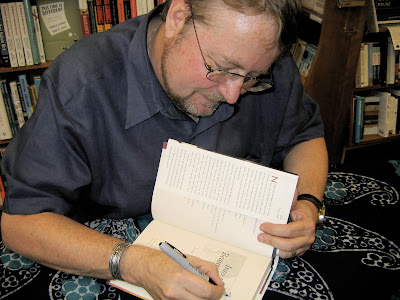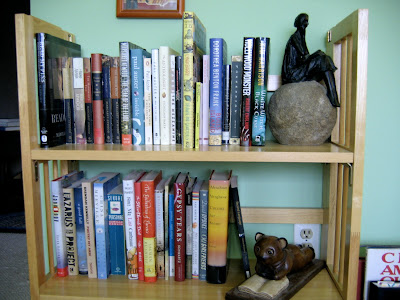 Dear Readers of Boston Bibliophile.com,
Dear Readers of Boston Bibliophile.com,
The BB has asked that I provide a “counter-review” of sorts for The Passage from the perspective of a genre reader familiar with tropes in post-apocalyptic stories. So, here goes.
On one level, The Passage explores ground that has been well-trodden in the past by countless hordes of shambling zombies. It is difficult to provide a review of this novel without giving spoilers; however, suffice it to say that when reading a novel set in a certain type of post-apocalyptic future, there are things that a genre-savvy audience might expect to see, including:
1) An ill-considered and unethical government experiment gone wrong
2) A sweeping biological cataclysm that defies the efforts of the military to contain it
3) A rampaging army of improbably durable and infectious undead
4) A tight-knit colony of human survivors scraping out a bare and depressing existence against the threat of inevitable extinction
5) The sometimes-sad, sometimes-humorous misinterpretation of our own culture by people on the other side of the apocalyptic divide
6) A bold quest through the wasteland in response to a gleaming light of hope
7) Encounters along the way with other survivors who might not have maintained quite the same level of civilization as our heroes
8) A discovery that the past is not quite as dead as believed
9) An ending replete with last-minute plot twists
Sure, the undead aren’t quite zombies, vampires, or other easily-identifiable undead from the Monster Manual. Nevertheless, there were many moments where I felt like I was ticking boxes in my head, or where I was able to predict what would happen next in the book simply by following the narrative conventions. To his credit, the author is plainly aware of the debt he owes to genre, and gives nods in that direction throughout the book; I appreciated a certain appearance of a shopping mall in the story (on the other hand, there is one movie reference late in the book where it seemed to me that the author was trying a little too cutely to point up the differences between his creations and a more familiar monster).
Okay, so the plot is derivative. Then why did I enjoy this book so much? Very simply, it is excellently written. The Passage is a fast-paced novel with gripping action sequences that nevertheless manages to depict realistic (if often disturbing) people. There were few if any main characters that seemed like thumbnail sketches (except for one character who appeared to have been added as a convenient love interest). Moreover, the author creates vivid and minutely-detailed depictions of the world at different times in its future history; the two main eras shown in the book are distinct from one another and from our own, but the differences are presented in a subtle and skillful way that creates almost photographic images of the world in its various phases rather than smacking the reader over the head with the message, “This is not the world you know.” And while the broad strokes of the plot were very familiar, the originality in the scene-by-scene details is striking, and kept me interested. With writing of this caliber, I was able to let the general plot fade into the background of my mind as sort of a reliable frame for the story, and focus instead on the characters and the action.
The story itself is told in an intriguing variety of voices and methods: third-person limited perspective dominates, but we are also treated to sweeping passages in third-person omniscient and narrative through the device of “archival evidence” recovered by a civilization at some point in the distant future (the identity and nature of this future civilization is one of the many mysteries of the book). As a student of ancient history myself, I enjoyed deducing the details of the cultures depicted from source documents.
There were some drawbacks to this approach, however. The author’s use of broad overviews and archival materials distances the reader from the grittiness of the story at times; on occasion, the use of an abstracted perspective led me to detach emotionally from the story. The Passage is epic in scope and it was clearly necessary to fast forward at times to keep things moving, but this was not just an issue in the places where the story skipped between eras. Instead, I felt like the author had a bit of a tendency to pull his punches rather than go into uncomfortable or emotionally intense detail. The convenient love interest mentioned above seems to have been inserted into the story for little reason other than to let a love triangle dissipate amiably without an emotionally-rending conclusion. Certain climactic scenes are narrated retrospectively, and the after-the-fact summary prevents the reader from experiencing the events as they unfold and feeling first-hand the level of terror that the characters would have. There is also arguably a little villain decay later in the book, where a threat that was presented as immediate and omnipresent appears to have been scaled back slightly to allow for the survival of the main characters in more dangerous situations. There is a legitimate plot-coherent explanation of this, but there is nevertheless a drop in the tension at certain points.
There is also, and let me be clear that this is not necessarily a complaint, very little gore in the book. The Passage will inevitably be compared by genre fans to Stephen King’s seminal work The Stand, given that The Passage ticks many of the same trope boxes as The Stand, echoes The Stand’s themes of scientific horror and spiritual hope, and sees its characters trekking across very similar geography. (I cannot quite decide whether the author’s choice to have Colorado and Las Vegas feature prominently in The Passage is an homage too far.) However, readers who are turned off by the kind of grisly detail that King does so well will have little to fear from The Passage. The Passage discreetly cuts away from certain kinds of violence where a horror novel would linger. In other words, The Passage is a thriller, not a horror novel. There are disturbing moments and revelations, but the author was clearly trying to inspire an adrenaline rush, not fear. On the whole, he succeeds remarkably.
-- Mr. Boston Bibliophile
You can read Marie's review here.
 The Lost Summer of Louisa May Alcott, by Kelly O'Connor McNees. Published 2010 by Amy Einhorn Books. Fiction.
The Lost Summer of Louisa May Alcott, by Kelly O'Connor McNees. Published 2010 by Amy Einhorn Books. Fiction.














































